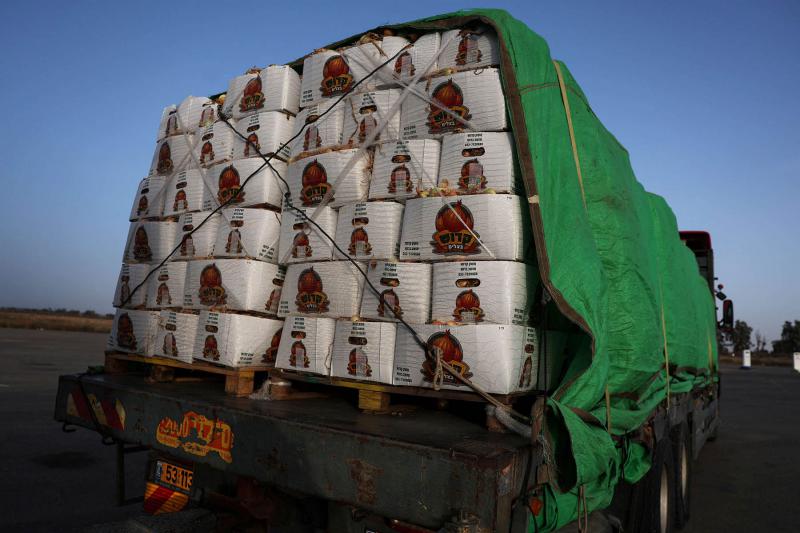UNITED NATIONS/ CAIRO
Food and medicine for Palestinians in Gaza are piling up in Egypt because the Rafah crossing remains closed and there has been no aid delivered to a UN warehouse from a US-built pier for two days, UN officials warned on Monday.
Senior UN aid official Edem Wosornu said there were insufficient supplies and fuel to provide any meaningful level of support to the people of Gaza as they endure Israel’s military onslaught against Hamas militants.
“We are running out of words to describe what is happening in Gaza. We have described it as a catastrophe, a nightmare, as hell on earth. It is all of these, and worse,” she said.
She told the UN Security Council that the closure of Rafah crossing from Egypt had stopped the delivery of at least 82,000 metric tonnes of supplies, while access at Israel’s Kerem Shalom crossing was limited due to “hostilities, challenging logistical conditions and complex coordination procedures.”
Egypt’s foreign minister said on Monday that cessation of aid deliveries through the Rafah crossing between Egypt and the Gaza Strip is connected to the threat posed to humanitarian work by Israel’s military operation in the area.
“Now there is a military presence on the outskirts of the Rafah crossing and military operations that put aid convoys and truck drivers in danger,” Sameh Shoukry told reporters after meeting his Greek counterpart in Cairo.
“The procedures resulting from Israeli military operations affect the operation of the Rafah crossing,” he said.
Activity has ceased at the Rafah crossing, which is positioned on Egypt’s 13 kilometre border with the Gaza Strip, since Israel stepped up its military offensive and took operational control of the crossing from the Gazan side on May 7.
International aid deliveries have been stuck on the Egyptian side of the border, leading to worries that some of the food supplies will perish. Parts of Gaza are at risk of famine after more than seven months of war.
Much of the aid delivered into Gaza since the start of the conflict between Israel and Hamas in October has come through Egypt, entering Gaza through Rafah or the nearby Kerem Shalom crossing on Israel’s border with the Palestinian territory.
Shoukry repeated calls for Israel to open other land crossings to deliver aid. “There are closed military crossings that should be used if there is real humanitarian concern about what is happening in Gaza,” he said.
Aid access into southern Gaza has been disrupted since Israel stepped up military operations in Rafah, a move that the UN says has forced 900,000 people to flee.
Israel’s UN Ambassador Gilad Erdan told the Security Council that Israel had not other choice but to go after Hamas in Rafah and that the removal of civilians from an active war zone should be supported and not condemned.
“They have moved to a designated humanitarian zone that is being filled with aid. And our hope is for many more civilians to leave Rafah and move out of harm’s way,” he said. “Temporary evacuation is reversible, but the loss of life is not.”
However, Wosornu described the situation for Palestinians at the new sites as horrendous.
In northern Gaza, where the UN warns a famine is imminent, Wosornu said the Erez crossing had been closed since May 9 and the newly-opened Erez West crossing “is now being used for limited quantities of aid, but now areas in the vicinity of this crossing are also under evacuation orders” by Israel.
Aid deliveries began arriving at a US-built pier on Friday as Israel comes under growing global pressure to allow more supplies into the besieged coastal enclave. The UN agreed to assist in coordinating aid distribution from the floating pier, but has remained adamant that deliveries by land are the best way to combat the crisis.
The UN said that ten truckloads of food aid, transported from the pier site by UN contractors, were received on Friday at a World Food Programme warehouse in Deir El Balah in Gaza.
But on Saturday, only five truckloads made it to the warehouse after 11 others were cleaned out by Palestinians during the journey through an area that a UN official said has been hard to access with humanitarian aid.
“They’ve not seen trucks for a while,” a UN official, speaking on condition of anonymity, told Reuters. “They just basically mounted on the trucks and helped themselves to some of the food parcels.”
The UN did not receive any aid from the pier on Sunday nor on Monday. “We need to make sure that the necessary security and logistical arrangements are in place before we proceed,” said the UN official.
Aid offloaded at the pier comes via a maritime corridor from Cyprus, where it is first inspected by Israel. The pier operation is estimated to cost $320 million and involve 1,000 US service members.
US officials have said the pier would initially handle 90 trucks a day, but that number could go to 150 trucks. The UN has said at least 500 trucks a day are needed to enter Gaza.
The United Nations has also warned of a severe fuel shortage in Gaza.
Wosornu said 654,000 litres of fuel had been delivered to Gaza since May 6, one quarter of the fuel allocations it had been receiving.


